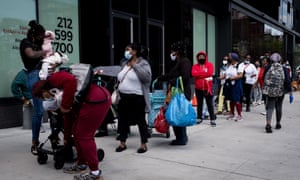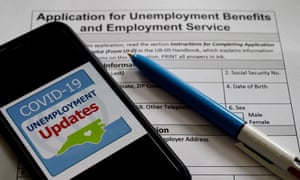Republicans, including the president, have opposed the additional funds. But their expiration could bring ‘incredible suffering’
- Coronavirus – latest US updates
- Coronavirus – latest global updates

Photograph: Alba Vigaray/EPA
James Phillips is someone the Republican party would rather people not know about. The 31-year-old is doing all he can to find work despite making 25% more money from unemployment benefits than he was paid in his last job as an administrative specialist.
The March coronavirus stimulus package provided an extra $600 in weekly unemployment benefits for four months for the now 39 million people who have lost their jobs because of the pandemic, inspiring Republicans to make bogeymen of the people earning more than before.
Senator Bernie Sanders ridiculed Republicans for opposing the emergency measure, pointing out that they were more than happy to cut taxes for the rich but wanted to stop aid for low-income workers. “Oh my God! The universe is collapsing,” Sanders mocked. But opposition remains. “I promise you, over our dead bodies will this get reauthorized,” the South Carolina senator Lindsey Graham said last month.
Donald Trump privately expressed opposition to it last week in a closed-door meeting with Republican senators, according to the Washington Post. The most common argument against it, that it “disincentivizes” workers, is a line the party used to knock unemployment insurance well before the crisis.
And yet Phillips estimates that he’s applied to 120 jobs since he was laid off a month ago because of coronavirus closures. To improve his chances of getting hired, he’s learning how to code and use Excel.
Phillips doesn’t have much of a choice. His father, whose hours have been cut, can’t get unemployment benefits. The extra money is going to his father, who he lives with, and to savings, for when the benefit expansion expires in July.
When that extra $600 runs out in July, said Phillips, “I don’t know what’s going to happen with our situation. We might be able to last until September – maybe.”
Those in support of the boost aren’t arguing that it’s perfect. But many economists agree the $600 fix was the best option available in a country with an antiquated unemployment system that can’t handle the current crisis. Even now millions are still waiting for tens of billions of dollars in benefits because the system is overwhelmed.
Heidi Shierholz, director of policy at the Economic Policy Institute, said because the US had decided to rely on unemployment insurance rather than the government-backed earnings replacement schemes favored in Europe, the extra cash was the best option. “It is the absolutely the right thing to do at a time like this,” she said.
Congress settled on $600 because it is roughly what the average worker makes each week. Researchers estimate somewhere between 40% and 68% of US workers could make more in unemployment than they did in their jobs with this benefit.
But the situation for each of those people is not cut and dry. Nearly one in four people are out of work in the US and others are facing cuts to their pay or hours. This means families, such as Phillips’s, could see any extra money being spent to recoup other income losses.
Low-wage workers are also more likely to work in the gig economy, such as driving for Uber and Lyft, where work has plummeted. Nearly one in three Americans who have a side hustle said that second job was necessary to pay their living expenses – work that is not accounted for in the analyses.
Democrats have proposed renewing the $600 boost, but if their efforts are unsuccessful, Shierholz said things could be “brutal” in August. At the macro level, it would mean pulling income out of the economy.
“It will also mean incredible suffering for people and families for whom that $600 was making it so they could survive in these extremely difficult times and now have it yanked out from under them,” Shierholz said. “There will just be an economic crisis for families. But it will also make the recession we are in now way worse and longer.”

Shierholz said she was concerned about how deeply some lawmakers were obsessed with the expansion.
“People have been wringing their hands over this horror that lower-income people are getting more, but they ignore the fact that people who were making more than the average worker are getting less and that hurts the economy,” Shierholz said.
Mark Harris, 64, was furloughed from his sales job at an international airline in Houston and is making 60% less with unemployment. He received unemployment only after calling Texas’s unemployment office at least 300 times, three days in a row.
He is OK for now – unemployment insurance is enough to help cover groceries and bills. His biggest concern is the bleak projections for the airline industry and the prospect that he might not be called back to his job, or any other job, at his age.
And of course, he is worried about what happens when enhanced unemployment expires and he is forced to dip into his savings. “I’ll be making less than now even – it’s going to be very difficult,” Harris said.
Last year, the weekly payment for unemployment was on average nearly $378, according to the US labor department. Come August, the workers who aren’t making more on unemployment will suddenly face an even bigger drop in pay.
‘Welcome to the world of your employees’
Outside of politicians, some small businesses who are struggling to hire back workers have complained that their employees won’t return to work because they are making more on unemployment. This is a particular concern because to qualify for forgiveness from the government’s Paycheck Protection Program (PPP) loan, designed to encourage businesses to keep staff on payroll, companies must spend 75% on payroll.
But John Pepper, founder and CEO of Boloco, a fast-casual burrito restaurant, is skeptical this is as big a problem as it is being made out to be. He doesn’t know if his company can weather the crisis, but he is certain it won’t be the unemployment boost that brings it down.
“I’m not worried about it because I think it’s right, it’s good for the people,” Pepper said. “If they don’t have to go right back to work for whatever reason, I think that’s fine.”
He compared the unemployment boost to a paid sabbatical, something typically reserved for higher-income, white-collar jobs. People who are making more money can look at other career opportunities or just take care of their family and health.
And if people are struggling to bring their workers back, a problem Pepper hasn’t encountered, he said it could be an indicator about the work conditions. “You are going to know if you have a good culture or not – this is where the rubber hits the road,” Pepper said.

Boloco has been able to keep paying 120 staff – who have received an additional $2 an hour in hazard pay since March – with help from the PPP loan.
That money runs out after eight weeks, which for Pepper is early June. He said he has never felt as unstable as he does right now.
But he said that uncertainty puts him, and other restaurant owners, in a similar position to the one low-wage employees have been living for years.
“All of a sudden, for the first time in many business owners’ lives, they were day-to-day, they were literally one day at a time in March, when this thing started coming in,” Pepper said. “I thought to myself: ‘Welcome to the world of your employees.’”
Thinking bigger than $600
The tensions around paying low wage workers more reflects the broader problem of inequality in the US. The extra $600 works out to $15 an hour for a 40-hour work week – the same figure labor activists have been pushing to be the national minimum wage.
The people who stand to benefit the most from the boost are those in the hardest-hit industries, such as hospitality, where wages were already low. These are also people facing uncertainty about when, and how many, jobs will be available.
Justin Wafer went from making about $550 a week as a bartender in Portland, Oregon, to about $1,000 a week on unemployment.
He said he would be fine without the boost because of his partner’s income – though he is using the extra money to pay off existing debts.
“I’m 36 years old, I’m tired of being behind a bar, so I have this complex feeling about it. I am happier now than I have been in years … I am happy to be getting the money, but I also am thinking I’m going to need to stockpile it because, well, there’s the possibility there won’t be any restaurant work for me when we open back up.”
Mary Kay Henry, president of the Service Employees International Union (SEIU), said the $600 was “a small step in the right direction”.
“But we also need to think bigger than boosting one particular benefit,” Henry said. “How are we going to make sure this level of crisis never happens again? How can we enact an equitable recovery plan that addresses the needs of all communities, especially communities of color?”
That includes helping those who don’t benefit from the unemployment boost – essential workers keeping grocery stores and factories running on the frontlines of the pandemic.
“As we reckon with what a post-Covid world looks like, we cannot forget who kept our country running in our moment of need,” Henry said. “Our healthcare workers, food-service workers and janitors, who are overwhelmingly black and brown workers, women and immigrants, deserve more than praise. They deserve nothing less than family-sustaining wages of at least $15 an hour and the right to form a union to lift up individuals and communities – both now and in the post-pandemic world.”
James’s and Mark’s last names were changed at their request



